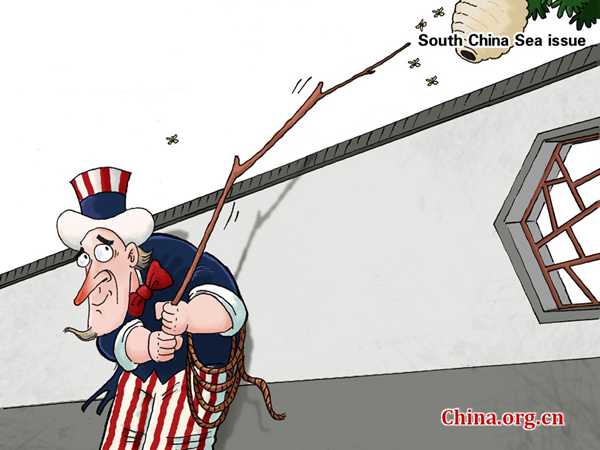US should consider big picture of the US-China relationship
- By Shen Dingli
 0 Comment(s)
0 Comment(s) Print
Print E-mail China.org.cn, June 14, 2015
E-mail China.org.cn, June 14, 2015
|
|
|
The trouble maker [By Zhai Haijun/China.org.cn] |
In recent years, China and the United States have entered into a furious dispute over the South China Sea. China has taken a series of actions to maintain its sovereignty and interests in the South China Sea.
On the one hand, China made a statement regarding the South China Sea issue in 2012 and presented evidence to the United Nations over the past year to demonstrate that Vietnam has admitted many times in written form that the Xisha and Nansha islands belong to China. China also published documents to state its stance on the South China Sea arbitration case regarding the rights of jurisdiction in the area questioned by the Philippines to show China's serious attitude.
On the other hand, China has announced the founding of Sansha City to implement administrative governance in its South China Sea jurisdiction. Recently China also explored oil, set up beacons, and expanded construction on the islands, which are great accomplishments for its sovereignty.
In the meantime, the United States didn't stand by and do nothing. Hillary Clinton, the then secretary of state, first started to attack China on the South China Sea issues in 2010 at the ASEAN Regional Forum Foreign Ministers' Meeting. The U.S. Department of State also published a policy document at the end of the last year entitled "Limits in the Seas: Maritime Claims in the South China Sea" to support the Philippines, which challenged China's sovereignty and interests in the South China Sea through a legal process.
The United States also ignored the facts that nations such as Vietnam and the Philippines have occupied China's territories in the South China Sea, demanding that all claimants keep the controversies at the level they were at in 2002, which means forever maintaining the "status quo" of those countries occupying China's territories. The United States also ignored the facts that countries like Vietnam and the Philippines have built so many constructions on China's islands, but asked China to restrain itself instead.
The fact that the United States has taken sides with Vietnam and the Philippines will only cause a greater imbalance in the South China Sea. The United States is very hostile against China's actions of expanding the construction on its own islands. It has sent navy spy planes to fly over closely to provoke China, and many American officials also threatened that they would consider sending navy warships to within 12 nautical miles from Chinese islands. Such statements reached a climax when U.S. Defense Secretary Ashton Carter made remarks as former U.S. Pacific Fleet commander Navy Adm. Harry B. Harris Jr. took over as Pacom commander during change-of-command ceremonies at the U.S. Pacific Command, the U.S. Pacific Fleet, and at the retirement of outgoing Pacom commander Navy Adm. Samuel J. Locklear III at the Pearl Harbor-Hickam joint base in Honolulu at the end of May. In his speech, Carter told China to stop expanding building artificial islands and he left no leeway.







Go to Forum >>0 Comment(s)